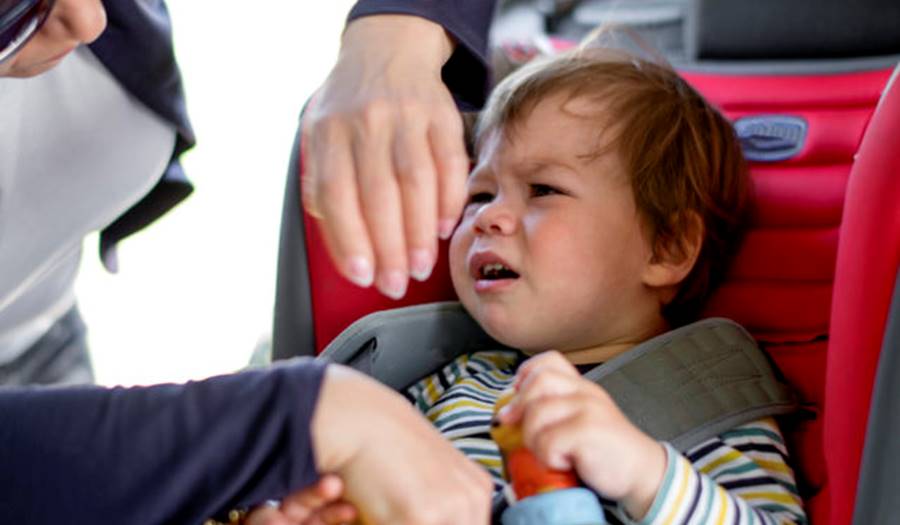
Car Seat Solutions
9/21/2020
CAR SEAT SOLUTIONS
Last week we learned about how to correctly install a car seat into your vehicle as well as which car seat is appropriate for you child based on their weight, height and maturity level. There was a lot to learn! This week we will learn about how to troubleshoot when your child doesn’t like their car seat, motion sickness, and special car seats.
MY CHILD HATES THEIR CAR SEAT!
We have all experienced that car trip (short or long) where your child is crying and distressed in their car seat It can be very stressful to hear your baby cry while trying to safely drive. If your child has a hard time in their car seat, consider the following reasons:
FIT:
The most common reason children crying in their seat is that they are not buckled properly, or their car seat is not installed correctly. Check to make sure the straps are tight and secure with the chest clip at the level of their armpit.
Make sure they have not passed the weight or size limit for their seat or for any infant padding that may be included with the seat.
Check that the seat is installed securely and at the right angle. Infant bucket seats often have a level on the side where green indicates the car seat is positioned at the right angle and red means it needs to be adjusted. Consider having the fit and installation of the seat rechecked by a car seat technician.
REFLUX:
Infants and toddlers with reflux can have a hard time getting comfortable in an infant bucket car seat. The position of infant bucket seat puts pressure on their stomach and can increase reflux. To help reduce this risk, consider waiting 30-40 minutes after a feed before using the car seat. You can also change your baby to a rear-facing convertible car seat. Often babies feel more comfortable in a convertible seat due to the more upright position. This position causes less reflux than the infant bucket seats more curved position. Convertible seats are appropriate even for newborn babies, with weight lower limits as low as 5lb, if installed correctly. The seat is often not used with newborns for convenience not increased safety.
SEPARATION ANXIETY:
As your baby grows and their brain develops, babies start to develop object permanence. This means they know you still exist even if they can’t see you! This is an exciting time but can result in separation anxiety. Because your child is in a rear-facing car seat at the time when this developmental stage happens, it can cause distress when they are in the car seat and can’t see you. If you are driving with someone else, having a parent or sibling close by in the back seat can be helpful for some children. For some older children, it can actually cause more distress as they don’t understand why they can’t be picked up. Obviously, you can’t drive and be in the back seat at the same time, so if you are the only adult in the car you will need another approach. First off, stay calm. Your baby will mirror your emotions. Stay positive and try to reassure your baby with a fun song or music. Keep talking to your baby and narrate your drive. With an older baby or toddler, try to engage them to look out the window and point things out that you may be passing.

COMFORT:
If your baby is upset in their car seat, make sure there is nothing making your child uncomfortable. Before they develop language skills, crying will be their only way of telling you something doesn’t feel right. This means checking to make sure there isn’t a big wrinkle in their outfit, or they aren’t accidentally sitting on a pacifier or other object. Check their straps and clips to make sure they aren’t pinching any skin. Babies, especially newborns, need our help to regulate their temperature, so check that your baby is not over bundled (as we learned last week, they should never have a heavy clothing or coat on in their car seat) or too cold. Also check to see if they have bright sun in their eye and consider using a window shade to block out the bright light.
RESTRAINT:
Lastly some children just do not like being restrained. This is a tough one to work on since it is the job of the car seat to restrain your child in the car. First off, always talk about the car seat in a positive light. Never apologize while strapping your child into their seat. As you strap them in talk about what the purpose of the car seat is for and how your job is to keep your child safe and healthy. You can acknowledge your child or toddler when they tell you they don’t like the seat. Sometimes just acknowledging their feeling can help them realize you understand them result in their cooperation. Additionally, letting your toddler and child be independent. This can mean letting them climb into the car and their car seat on their own or help with clips or buckles. Positive praise for cooperation or any time they easily get in their car seat is important. A sticker chart with small rewards can also be helpful in working with a toddler to easily get in their car seat.
THE CAR MAKES MY CHILD SICK!
MOTION SICKNESS
Motion sickness can make car rides very challenging. Children as young as 3 months can experience motion sickness in the car. Younger children often show they are starting to become motion sick by being extremely fussy in the car. Toddlers and older children may complain of headaches, dizziness, extra spit in their mouth, and feeling hot. Here are some tips to help your child through motion sickness:
- Position your child’s car seat so they can see out a front window (if forward-facing) or the back window (if rear-facing).
- Do not put a child who is under 2 forward-facing to help with motion sickness. This is dangerous and actually doesn’t help motion sickness decrease in severity or frequency.
- If your child starts to feel sick, stop the car and get your child out of the car for a short break.
- Keep the car cool either with air conditioning or keeping the windows down
- Make frequent stops for breaks
- Make sure your older child has access to fluids and starchy snacks. They should take small frequent sips and small frequent bites.
- Before leaving for your car trip, make sure your child has an easy to digest starchy snack.
- Consider ginger candy or Queasy Pops before your trip starts
- Consider medication in children 2 years or older for longer trips. These medications include antihistamines Dramamine and Benadryl. These medications should be administered 1 hour before you start your trip and can be repeated every 4-6 hours.
MY CHILD HAS A CHRONIC HEALTH CONDITION. WHAT CAR SEAT OPTIONS DO THEY HAVE?
If your child has a chronic medical condition, they may need an adaptive car seat. These conditions may include autism, airway issues, cognitive or developmental delays, as well as conditions that result in low muscle tone. An adaptive car seat may also be used for a short-term period such as with premature infants or with children who are in special casts or whom have recently had surgery. There are many styles of adaptive car seats designed for different medical conditions.

For premature newborns or infants who are unable to maintain an open airway in an infant bucket seat, they may be advised to use a car bed, a flat bassinet looking car seat. There are also adaptive rear-facing convertible car seats that can be customized based on your child’s need.
For children with mild disabilities, a standard convertible car seat may be safe but for children with more significant needs a special forward-facing car seat may be required. These car seats have accessories that can be added on such as foot supports, lateral supports, hip supports, lap trays, head positioners, or a recline bar. Often these adaptive car seats can hold children up to 75-130lbs depending on the specific seat.
For older children there are adaptive booster seats available. These boosters can often recline and include extra positioners, 4-or-5-point harnesses and can be used for children up 225lb depending on the model. A vest may also be an option for children who have adequate head, neck and trunk support but may need extra support or extra restraint in a car. These vests are often weighted which can be comforting for children with autism or sensory needs.
Some children may also be transported by wheelchair in a vehicle either due to size, postural needs, or to reduce the number of transfers in and out of their chair. Many wheelchairs are designed to be used in vehicles. This may require a car or van to be modified to include tie down restraints.
If your child needs an adaptive car seat, they should work with an occupational therapist or physical therapist who is certified as a car seat technician. This provider will evaluate your child and determine which car seat is provides the best and safest positioning. Often Medicaid will cover the cost of these adaptive seats. If your plan does not, there are programs that can help defer the cost such as Easter Seals and Safe Kid coalition. If your child will be traveling in their wheelchair, a therapist will recommend equipment to ensure safe transportation and work with you to make sure you are securing and using the adaptive equipment correctly. Depending on equipment or any vehicle modifications, this can be a costly endeavor. These costs can sometimes be reduced working with your automotive insurance company, nonprofit organizations, the National Mobility Equipment Dealers Association, and your health care insurance.
At Children’s Health Care, your child’s safety is important to us. If you need any help determining the appropriate car seat for you child or troubleshooting any problems you may be having with your child and their car seat, please let us know!
Children’s Health Care of Newburyport, Massachusetts and Haverhill, Massachusetts is a pediatric healthcare practice providing care for families across the North Shore, Merrimack Valley, southern New Hampshire, and the Seacoast regions. The Children’s Health Care team includes pediatricians and pediatric nurse practitioners who provide comprehensive pediatric health care for children, including newborns, toddlers, school aged children, adolescents, and young adults. Our child-centered and family-focused approach covers preventative and urgent care, immunizations, and specialist referrals. Our services include an on-site pediatric nutritionist, special needs care coordinator, and social workers. We also have walk-in appointments available at all of our locations for acute sick visits. Please visit chcmass.com where you will find information about our pediatric doctors, nurse practitioners, as well as our hours and services.
Disclaimer: this health information is for educational purposes only. You, the reader, assume full responsibility for how you choose to use it.








